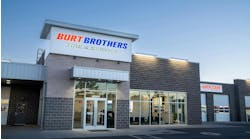Tire Dealer Survival Guide: How to Keep Your Deal Alive When Selling Your Business
As one gets older, the thought of death seems to come up more often. At least it does for me. It’s not just the human deaths I find regrettable and tragic, but it’s company deaths, as well.
I have lived long enough to have seen huge projects that were initiated at the start of my career in the early 1980s rise and fall to their deaths decades later, including projects like Saturn, which was developed by General Motors.
I first read in 1983 in the Wall Street Journal about how Saturn was going to revolutionize the car business. Their first car came off the assembly line eight years later in 1991. The company grew and expanded into a full product line, but the credit squeeze of 2008 put them in the grave.
Likewise, the first Circuit City store I visited was in the early 1980s on a tire company business trip to North Carolina. That’s about the time Circuit City officially changed its company name and went public. Like Saturn, Circuit City grew nationwide steadily, then peaked, circled the drain and died around 2009, when it was liquidated.
Smaller companies are no less vulnerable to extinction. Having less capital to weather tough economies, keep up with the competition, overcome bad decisions or embezzlement — it happens to tire dealers more often than you think — can kill a company fast.
Heck, stepping off a curb and getting hit by a bus can do the same when a business owner is the driving force behind the company. It can all fall apart if there’s no succession plan or if the next generation is not willing to step up.
So when a decision is made to exit, make it happen. Don’t waste everyone’s time with a half-hearted effort. Go all out, but don’t make a dead deal.
That’s why I thought that avoiding the mistakes that cause dead deals makes a perfect topic for MTD’s Tire Dealer Survival Guide.
The best place to start is to understand why deals die. In a recent edition of my monthly MTD column, I reported some statistics from Axial’s “Dead Deal Report.” A private deal network that covers the lower middle market in the United States and Canada, Axial investigated 47 transactions across a variety of industries. In each deal, a letter of intent to purchase a business was signed by both a buyer and seller. And in each situation, for some reason, the deal did not close.
Overall, 49% of the deals died for financial reasons and 51% died for non-financial reasons. Drilling down into specifics, 19% of the deals died because the transaction couldn’t get financed; 17% died because the quality of earnings report, which is typically funded by the buyer, came back with substantially lower EBITDA; and 12.8% of deals died because there was a “valuation misalignment” between a buyer and a seller.
Looking at non-financial reasons, 17.1%, of deals died because the “seller backed out.” Another 17% of deals died for non-financial reasons discovered in due diligence. And the last category is the catch-all “other” at 17%.
The biggest thing to avoid when making any deal is to let the deal drag out. This is a cardinal sin in my business. Too much time kills all deals.
One of the primary reasons for letting a deal drag out can often be traced to the lack of preparation by sellers before they enter the process. A recent survey of investment bankers on the Axial platform found that fewer than 25% of sellers are prepared to sell when they go to market.
From what I’ve seen, lack of preparation manifests in some of the following ways:
- Lack of shop cleanliness and organization of financial statements;
- No succession planning and nobody to perform the owner’s functions after the owner leaves;
- Owners not understanding their own financial records, nor the condition of their assets and customer base;
- Slow responses to buyer information requests, and;
- Not having fair market rent on the property or properties involved in the business.
Letting your business turn down as you are in the market is the next big mistake. Buyers are skittish, particularly with businesses they are unfamiliar with.
While strategic buyers may know your business better than financial buyers, both really don’t know your exact market or the peculiarities of how you operate your business. They make an offer based on what your business has done over the last year, expecting that it will continue. If, as things progress, they start to see softness in your sales and profits, that will scare them. You can expect to have a discussion on this matter and you might see a haircut on the valuation, as well.
There is one very simple way to avoid this. Do not take your eye off the ball. Double down on being aggressive in generating revenue and producing profit. The easiest thing to do is to develop new sales and profit incentives that align with the results that buyers want to see. Don’t hide the incentives from your buyer. Be transparent about them. There is nothing at all wrong in doing this.
The third biggest mistake is a combination of issues that all result from a lack of familiarity with the exit process, but particularly during due diligence. There are so many things that go on in a business sale that there is no way for a seller to know what they are in advance. I always say the seller knows everything about his business, but nothing about the exit process. This lack of familiarity invariably results in the seller riding an emotional rollercoaster.
Frustration can often result over the numerous information requests and the never-ending questions that a seller can mistakenly take personally (“What? They don’t trust me?”)
A deep dive into the average working capital required in the business is often beyond a seller’s financial understanding. Nervousness from buyers about potential environmental issues, customer concentration, the likelihood of lease transfers and the 20 or so representations and warranties a seller will be required to sign are not things a seller thinks about every day, but will certainly have to reckon with.
Not understanding the need for a selling process can result in not going broad enough to comb the market for the best buyer. This can lead to doubts at the closing table and backing out at the last minute (“Can I do better?”)
The combined weight of all these process issues once caused a seller I knew to get hospitalized with heart palpitations and shingles. The solution is to get good representation with a team that has done this before so they can talk you off the ledge every time you crawl out there.
Hiring experienced brokers or investment bankers who know your industry and attorneys who specialize in transactions can help. Certified public accountants are useless here other than for tax planning. (To familiarize yourself on the process, I encourage you to read my book “Buy, Build, Fix, Sell.” It’s specifically written for tire dealers and available on Amazon.)
The last big mistake to avoid in deals has to do with misrepresenting and trying to hide things from a buyer. I find that the more open and transparent a seller is, the more relaxed the buyer will be. Being forthcoming and honest lowers the perceived risk a buyer has about your business. Being cagey, shading facts and misrepresenting do the opposite.
If you are going to stay on and be involved in the business after the sale and roll over some equity, it’s more likely that the buyer is going to do a background check on you.
If they discover stuff hidden in your background that relates to any sort of financial fraud or bankruptcy, they are going to think twice about being in business with you. So instead, build rapport with your buyer by being honest and transparent.
And if bad news comes up, disclose it fast and early and never try to hide it.
In one recent case, my tire dealer client lost a key store manager. We reported it to the buyers right away, along with the countermeasure, and we simply promoted somebody better into that store manager position. Problem solved and the deal moved forward.




